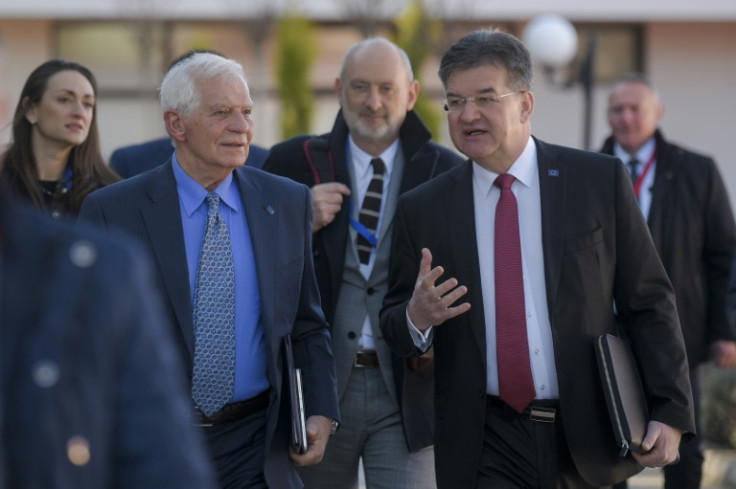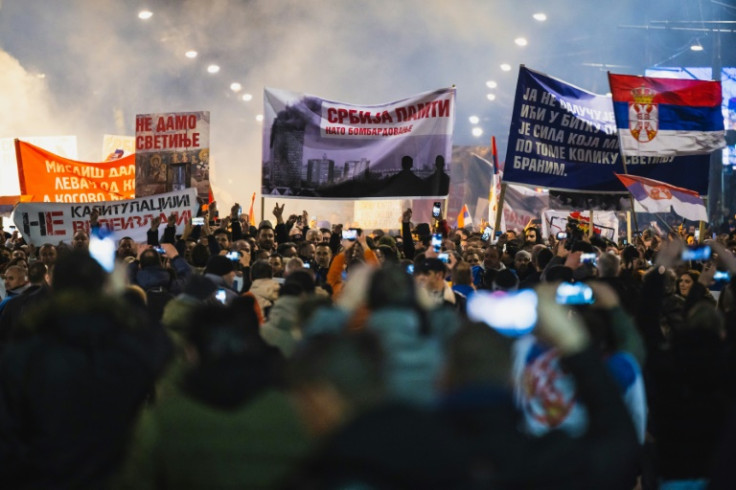Serbia, Kosovo leaders hold talks over EU peace plan
The meeting in North Macedonia comes after the two sides failed to reach an agreement in Brussels last month

Kosovo and Serbia leaders gathered Saturday for the latest round of EU-led talks, as the long-time rivals come under increasing pressure to strike a deal to normalise ties.
The meeting in North Macedonia comes after the two sides failed to reach an agreement in Brussels last month, where the peace plan was unveiled even as Kosovo's Prime Minister Albin Kurti and Serbian President Aleksandar Vucic remained at loggerheads over a path forward.
The 11-point document laid out a deal stating that neither side would resort to violence to resolve a dispute, nor seek to prevent the other from joining the European Union or other international bodies -- a key demand from Kosovo.

Serbia has long refused to recognise Kosovo's unilateral declaration of independence made in 2008, with perennial bouts of unrest erupting between Belgrade and its former breakaway province.
Following the talks in Brussels, Vucic vowed never to recognise Pristina or provide a pathway that would allow them to join the United Nations or the NATO alliance.
Before the summit hosted by EU foreign policy chief Josep Borrell, Vucic struck a defiant tone.
"I don't plan on signing anything," Vucic told reporters Thursday, saying the meeting "will not be historic or groundbreaking".
The latest round of talks followed months of shuttle diplomacy, nearly 25 years after the war between ethnic Albanian insurgents and Serb forces sparked a NATO bombing campaign that ended the conflict.
On Tuesday, Kosovo's Kurti said he was optimistic about hammering out a deal but put the onus of signing the agreement with Vucic.
"Whether it will succeed or not, you know very well that it does not depend only on me," Kurti told reporters.
Analysts said inking the agreement itself would not signal an ultimate breakthrough.
"I expect both parties to agree on the implementation plan. I can't say it's big because the big thing will happen only after the plan is implemented," said Dusan Milenkovic from the think tank Center for Social Dialogue and Regional Initiatives.
Kurti's administration hopes that a deal would allow for Kosovo's entry into international institutions, a long-sought goal for the government in Pristina.
Serbia's Vucic has said his government is under intense pressure to come to an understanding, while signalling to his domestic rivals that he will not give ground.
Kosovo remains an obsession among large swaths of the Serbian population, who regard the territory as their rightful homeland that has come under attack by outsiders for centuries.
In the Serbian capital Belgrade on Friday, thousands rallied against striking a deal with Kosovo.
"This ultimatum ... it's not an agreement, it's a betrayal," Milica Djurdjevic Stamenkovski, head of the ultranationalist group the Oath Keepers told the crowd.
Kosovo is home to approximately 120,000 Serbs, many of whom remain loyal to Belgrade -- especially in northern areas near the border with Serbia where there are frequent bouts of turmoil, protests and occasional violence.
© Copyright AFP 2025. All rights reserved.





















